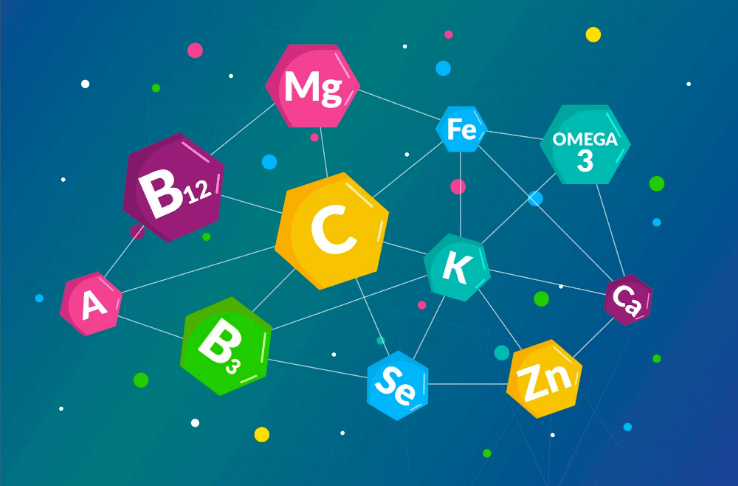
Essential Vitamins and Minerals: The Key to a Healthy Body
Taking care of your health doesn’t have to be complicated. One of the simplest and most effective ways to keep your body running smoothly is by ensuring you get the essential vitamins and minerals it needs. These nutrients play a crucial role in various bodily processes, from energy production to disease prevention. Let’s explore the most important ones, their functions, and how you can include them in your diet.
Essential Vitamins: Fuel for Your Body
Vitamins are organic compounds your body requires in small amounts but cannot produce on its own. Here’s a practical guide:
1. Vitamin A: For Clear Vision and Healthy Skin
- Function: Vital for eye health, immune system support, and skin health.
- Sources: Carrots, sweet potatoes, spinach, liver.
- Practical example: A salad with carrots and spinach is a delicious way to get this vitamin.
2. B Complex: Energy and Brain Function
The B-complex group includes several vitamins that work together:
- B1 (Thiamine): Helps with energy metabolism and nervous system function.
- Sources: Whole grains, pork, seeds.
- B2 (Riboflavin): Important for energy production and skin health.
- Sources: Milk, eggs, leafy greens.
- B6 (Pyridoxine): Necessary for neurotransmitter production and immune health.
- Sources: Chicken, fish, bananas.
- B12 (Cobalamin): Essential for red blood cell formation and neurological function.
- Sources: Meat, eggs, dairy products.
3. Vitamin C: The Power of Antioxidants
- Function: Acts as an antioxidant, boosts immunity, and aids in collagen production.
- Sources: Oranges, lemons, strawberries, broccoli.
- Tip: A glass of fresh orange juice is the perfect way to start your day.
4. Vitamin D: The Sunshine Vitamin
- Function: Supports calcium absorption for strong bones.
- Sources: Sunlight, fatty fish, eggs.
- Fun fact: Just 15 minutes of sunlight daily can provide a good dose of vitamin D.
5. Vitamin E: Cellular Protection
- Function: An antioxidant that protects cells from damage.
- Sources: Almonds, sunflower seeds, olive oil.
6. Vitamin K: Essential for Blood Clotting
- Function: Needed for blood clotting and bone health.
- Sources: Kale, broccoli, spinach.
Essential Minerals: The Foundation of Body Function
Minerals are inorganic substances that play an important role in keeping your body functioning properly. Here are the key ones:
1. Calcium: Strong Bones and Beyond
- Function: Crucial for healthy bones and teeth, and muscle contraction.
- Sources: Milk, yogurt, sardines, kale.
2. Iron: Oxygen Transport
- Function: Essential for hemoglobin formation.
- Sources: Red meat, beans, spinach.
- Tip: Consuming iron with vitamin C (like lemon or orange) improves absorption.
3. Magnesium: Relaxation and Energy
- Function: Aids in muscle relaxation and blood sugar regulation.
- Sources: Avocado, nuts, whole grains.
4. Zinc: Immunity and Healing
- Function: Supports DNA synthesis and immune function.
- Sources: Oysters, red meat, pumpkin seeds.
5. Selenium: A Powerful Antioxidant
- Function: Protects cells from oxidative damage.
- Sources: Brazil nuts, tuna, eggs.
6. Potassium: Fluid Balance
- Function: Helps with muscle function and fluid regulation.
- Sources: Bananas, potatoes, avocados.
7. Phosphorus: Energy and Healthy Bones
- Function: Necessary for bone formation and energy production.
- Sources: Fish, dairy products, seeds.
How to Maintain Nutritional Balance?
Maintaining a balanced diet is easier than it seems. Here are some tips:
- Variety is Key: Include foods from different groups, such as fruits, vegetables, whole grains, lean proteins, and healthy fats.
- Moderate Supplement Use: Supplements can be helpful for deficiencies but should always be taken under medical supervision.
- Avoid Excesses: Overconsumption of vitamins and minerals can lead to toxicity, especially fat-soluble vitamins (A, D, E, and K).
Common Questions About Vitamins and Minerals
1. Can You Get All Nutrients from Food Alone?
Yes, but it depends on having a varied and balanced diet. In some cases, like pregnancy or restrictive diets, supplements may be needed.
2. Are Supplements Safe?
When used correctly and under guidance, they are safe. Choose reputable and certified brands.
3. How Do I Know If I Have a Nutrient Deficiency?
Symptoms vary but may include fatigue, hair loss, brittle nails, and low immunity. Consult a doctor for testing.
4. Are Natural Vitamins Better Than Synthetic Ones?
Natural vitamins from food come with additional nutrients, but synthetic supplements are effective for correcting deficiencies.
Conclusion
Keeping your vitamin and mineral levels in check is essential for a healthy body. A balanced diet rich in diverse foods is the best way to get these nutrients. If you suspect a deficiency, consult a healthcare professional before starting any supplementation. Treat your body with care and remember: good health starts with simple daily choices.

Fill the nutritional gaps
Even with a healthy diet, it’s common to miss out on essential daily nutrients. NuviaLab supplements are here to bridge that gap, ensuring your body gets the vitamins and minerals it needs.
With the right combination of nutrients, you can strengthen your immune system, reduce the risk of illnesses, and maintain your overall well-being.
Don’t Wait!
Invest in your health today and unlock the transformative potential of NuviaLab supplements.
Click here to visit the official website and start your journey to a healthier and more balanced life.
Special Offer
Take advantage of this exclusive offer to buy 3 bottles and get 3 more free! Limited time offer while the supplies last.
Check out the available offer now!click here
By clicking on the photo you will be redirected to the official site NuviaLab







Leave a Reply